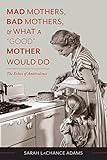Mad Mothers, Bad Mothers, and What a "Good" Mother Would Do : The Ethics of Ambivalence / Sarah LaChance Adams.
Material type: TextPublisher: New York, NY : Columbia University Press, [2014]Copyright date: ©2014Description: 1 online resource (272 p.)Content type:
TextPublisher: New York, NY : Columbia University Press, [2014]Copyright date: ©2014Description: 1 online resource (272 p.)Content type: - 9780231166751
- 9780231537223
- 306.874/3 23
- BJ1610 .L1455 2014
- BJ1610 .L1455 2014
- online - DeGruyter
- Issued also in print.
| Item type | Current library | Call number | URL | Status | Notes | Barcode | |
|---|---|---|---|---|---|---|---|
 eBook
eBook
|
Biblioteca "Angelicum" Pont. Univ. S.Tommaso d'Aquino Nuvola online | online - DeGruyter (Browse shelf(Opens below)) | Online access | Not for loan (Accesso limitato) | Accesso per gli utenti autorizzati / Access for authorized users | (dgr)9780231537223 |
Frontmatter -- Contents -- Acknowledgments -- 1. Mad Mothers, Bad Mothers, and what a "Good" Mother Would Do -- 2. The Mother as Ethical Exemplar in Care Ethics -- 3. Motherhood's Janus Head -- 4. Maternity as Vulnerability in the Philosophy of Emmanuel Levinas -- 5. Maternity as Dehiscence in the Flesh in the Philosophy of Maurice Merleau-Ponty -- 6. Maternity as Negotiating Mutual Transcendence in the Philosophy of Simone De Beauvoir -- Conclusion -- Notes -- Bibliography -- Index
restricted access online access with authorization star
http://purl.org/coar/access_right/c_16ec
When a mother kills her child, we call her a bad mother, but, as this book shows, even mothers who intend to do their children harm are not easily categorized as "mad" or "bad." Maternal love is a complex emotion rich with contradictory impulses and desires, and motherhood is a conflicted state in which women constantly renegotiate the needs mother and child, the self and the other. Applying care ethics philosophy and the work of Emmanuel Levinas, Maurice Merleau-Ponty, and Simone de Beauvoir to real-world experiences of motherhood, Sarah LaChance Adams throws the inherent tensions of motherhood into sharp relief, drawing a more nuanced portrait of the mother and child relationship than previously conceived. The maternal example is particularly instructive for ethical theory, highlighting the dynamics of human interdependence while also affirming separate interests. LaChance Adams particularly focuses on maternal ambivalence and its morally productive role in reinforcing the divergence between oneself and others, helping to recognize the particularities of situation, and negotiating the difference between one's own needs and the desires of others. She ultimately argues maternal filicide is a social problem requiring a collective solution that ethical philosophy and philosophies of care can inform.
Issued also in print.
Mode of access: Internet via World Wide Web.
In English.
Description based on online resource; title from PDF title page (publisher's Web site, viewed 02. Mrz 2022)


